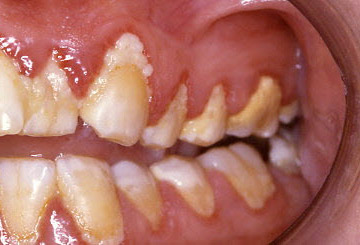Summary
Definition
History and exam
Key diagnostic factors
- presença de fatores de risco
- sangramento na escovação dos dentes
- placa dental bacteriana
- necrose e ulceração na gengiva livre
Other diagnostic factors
- halitose
- gengiva avermelhada e edemaciada
- formação de pseudomembrana
- linfadenopatia cervical
- febre
- mal-estar
- dor
Risk factors
- higiene bucal ineficiente
- tabagismo
- diabetes mellitus
- gestação
- grave desnutrição ou deficiências nutricionais marginais
- HIV/AIDS (na gengivite necrosante [GN])
- estresse (na gengivite necrosante [GN])
- infecções (virais) graves (na gengivite necrosante [GN])
- história pregressa de gengivite necrosante (GN)
- estresse (na gengivite induzida por placa dental bacteriana)
- medicamentos xerostômicos
- sexo masculino
- condições de habitação precárias (gengivite necrosante [GN])
- ingestão elevada de bebidas alcoólicas
- uso de substâncias
Diagnostic tests
1st tests to order
- diagnóstico clínico
Treatment algorithm
gengivite necrosante (GN)
gengivite não necrosante
Contributors
Authors
Giuseppina Campisi, DDS, MS
Professor of Oral Diseases
Department of Surgical, Oncological and Oral Sciences
School of Dentistry
University of Palermo
Palermo
Italy
Disclosures
GC declares that she has no competing interests.
Giuseppe Pizzo, DDS
Associate Professor of Periodontology and Dental Public Health
Department of Surgical, Oncological and Oral Sciences
School of Dentistry
University of Palermo
Palermo
Italy
Disclosures
GP declares that he has no competing interests.
Acknowledgements
Dr Giuseppina Campisi and Dr Giuseppe Pizzo would like to gratefully acknowledge Dr Bruce L. Pihlstrom and Dr Alice E. Curran, previous contributors to this topic.
Disclosures
BLP and AEC declare that they have no competing interests.
Peer reviewers
Gary Armitage, MD
Professor
Division of Periodontology
University of California
San Francisco
CA
Disclosures
GA declares that he has no competing interests.
Lynn Solomon, MD
Assistant Professor
Tufts University
Boston
MA
Disclosures
LS declares that she has no competing interests.
Donald J. DeNucci, DDS, MS
Program Director
Practice Based Research Networks
National Institute of Dental and Craniofacial Research
NIH
Bethesda
MD
Disclosures
DJD declares that he has no competing interests.
Stephen Porter, BSc, PhD, MD, FDSRCS, FDSRCSEd, FHEA
Institute Director
Professor of Oral Medicine
Academic Head, Oral Medicine and Special Needs Dentistry Unit
Honorary Consultant in Oral Medicine, UCLH NHS Foundation Trust
UCL Eastman Dental Institute
London
UK
Disclosures
SP declares that he has no competing interests.
Marco Carrozzo, MD, DSM
Professor of Oral Medicine
School of Dental Sciences
University of Newcastle Upon Tyne
UK
Declarações
None declared
Créditos aos pareceristas
Os tópicos do BMJ Best Practice são constantemente atualizados, seguindo os desenvolvimentos das evidências e das diretrizes. Os pareceristas aqui listados revisaram o conteúdo pelo menos uma vez durante a história do tópico.
Declarações
As afiliações e declarações dos pareceristas referem--se ao momento da revisão.
Referências
Principais artigos
Chapple ILC, Mealey BL, Van Dyke TE, et al. Periodontal health and gingival diseases and conditions on an intact and a reduced periodontium: Consensus report of workgroup 1 of the 2017 World Workshop on the Classification of Periodontal and Peri-Implant Diseases and Conditions. J Periodontol. 2018 Jun;89 Suppl 1:S74-84. Resumo
Farah CS, Balasumbramaniam R, McCullough MJ. Contemporary Oral Medicine. A Comprehensive Approach to Clinical Practice. 1st ed. New York, NY: Springer International Publishing; 2019.
Public Health England (PHE). Delivering better oral health: an evidence-based toolkit for prevention. 3rd ed. London: Department of Health; 2021.Texto completo
Artigos de referência
Uma lista completa das fontes referenciadas neste tópico está disponível para os usuários com acesso total ao BMJ Best Practice.

Diagnósticos diferenciais
- Líquen plano oral
- Penfigoide
- Pênfigo
Mais Diagnósticos diferenciaisFolhetos informativos para os pacientes
Abandono do hábito de fumar
Mau hálito
More Folhetos informativos para os pacientesLog in or subscribe to access all of BMJ Best Practice
Use of this content is subject to our disclaimer